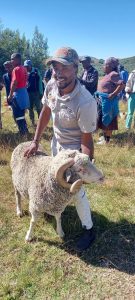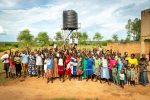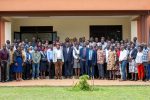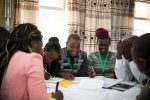From University of Free State Classroom to Communal Farming Innovator: The Journey of Bonga Madyibi
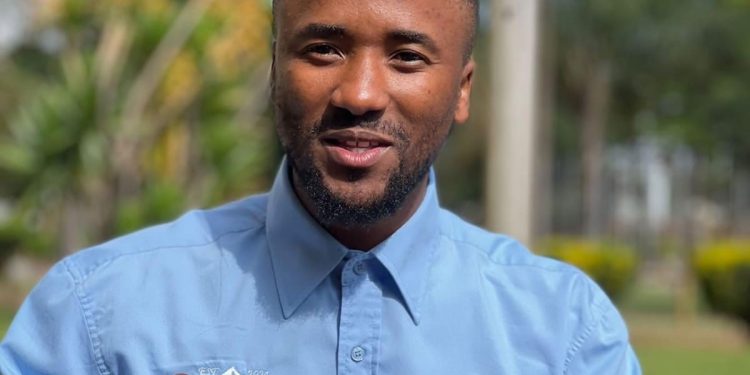
By: Yolisa Xatasi
How one University of the Free State alumnus, young farmer Bonga Madyibi from Matatiele, is leveraging his education and a passion for livestock to revolutionize sustainable farming practices, empower his community, and build a thriving entrepreneurial venture from the ground up.
For Bonga Madyibi, a lifelong passion for agriculture, sparked during childhood holidays spent tending to his uncle’s livestock, has blossomed into a career defined by innovation and community leadership. His journey from a young animal lover to a successful sheep farming entrepreneur is a powerful testament to how a world-class education, combined with hands-on experience, can cultivate lasting change.
His path was set when he chose to pursue his qualifications at the University of the Free State (UFS). “I heard that the agricultural degree at the University of the Free State is one of the best in the agricultural sector,” he recalls, a decision that would prove foundational to his future success.
A Turning Point: The RUFORUM Wool Project
While studying for his MSc in Animal Health at UFS, Bonga Madyibi became involved in the RUFORUM Wool Project, an initiative led by Prof. Jan Swanepoel. This experience was far more than an academic requirement; it was a profound awakening.
“The project was an eye-opener,” he states. “It gave me firsthand experience of how communal farmers in the Free State were operating and made me realize the gap that is between commercial and communal farmers in terms of practice and efficiency.”
This wasn’t just a research finding; it was a call to action. The project equipped him with a critical, tangible skill that would become a cornerstone of his career: wool classing. “The wool classing skills were a light to my dim eyes,” he explains. This newfound expertise led him to pursue a wool handling course with the National Wool Grower’s Association, a move that directly impacts his business today. “With this skill, I am now able to select quality stock whenever I want to purchase new animals,” he says. “It also helps with classing our wool in our Shearing shed, because that results in better returns.”
From Graduate to Entrepreneur: A Rollercoaster Ride to Success
Upon graduating, Bonga Madyibi chose the challenging path of entrepreneurship. “It’s been a rollercoaster,” he admits, “but as the years roll, I’ve been getting better at this sheep farming business.” His persistence and strategic mindset paid off. 2024 marked a year of pivotal milestones. He successfully secured a loan from the Eastern Cape Rural Development Agency (ECRDA) to purchase 62 animals, and further funding from the Small Enterprise Development Agency (SEDA) allowed him to acquire another 100.
He attributes his success to a combination of unwavering passion and a realistic, determined mindset. “Not expecting everything to work out immediately but still being able to put as much effort as one possibly can,” he advises. “I am always trying to develop either myself or my businesses through various means such as networks and attending courses.”
Despite launching his farming venture in 2024, his first year presented a significant challenge. A devastating incident with local predators (rooikats) resulted in the loss of several pregnant ewes, severely impacting the lambing season and preventing any income from the sale of weaners. However, demonstrating true resilience, he still managed to establish an income stream, generating R26,000 (USD 1,460.00) from wool sales. Now in 2025, he is focused on recovery and growth. With a more successful lambing season anticipated, he projects a substantial increase in revenue by selling approximately 40 weaners at R1,500 (USD 84.00) each, which would generate a potential income of R60,000 (USD 3,400) from livestock sales alone.
Innovation in Action: Solving Overgrazing on Communal Land
Perhaps his most significant achievement is his innovative approach to sustainable farming within a communal area. Faced with the widespread problem of overgrazing, he secured the rights to fence off a 10-hectare plot for his own production plan. He strategically divided the land into four camps (4 ha, two 2 ha, and 1 ha) to serve as dedicated lambing and weaning camps. This system, combined with a rotational grazing plan where a shepherd moves the flock daily, directly addresses one of rural agriculture’s most pressing challenges. “It is solving the problem of overgrazing in rural areas,” he explains. “One of the measurable impacts is that it increases the carrying capacity of the land over time. This means we can farm with more animals on the same land and still have good pastures.”
Leading by Example: A Ripple Effect of Change
Bonga Madyibi’s impact extends far beyond his own flock. By demonstrating the success of his methods, he is inspiring tangible change among the communal farmers he works alongside. “Back home in our Shearing shed, they used to buy poor quality animals and sometimes would use the same rams from their own flock, leading to inbreeding,” he shares. While government stakeholders had tried to intervene, he notes, “I think they just wanted someone to do it in front of them.”
Through his own production and by openly sharing information, he has seen a significant shift. “Some have even started buying quality ewes as well as rams,” he says proudly. His commitment to improving the local farming community goes further: he has shared his best practices with 30 local farmers to date. He also directly assists those who need superior genes by loaning them one of his best rams, and in return, they gift him two lambs. This grassroots leadership is bolstered by his active involvement in organizations like YARD, GrainSA, and the Matatiele Agri Hub.
Reflecting on his journey, he emphasizes the critical role of his university education. “My degree played a huge role when it comes to the funding and loan I received. Without it, I doubt I would’ve received it,” he asserts. Looking to the future, he hopes to be at the forefront of the sustainable farming movement, encouraging others to work with nature to ensure profitability and a better tomorrow.
To future students and potential beneficiaries of the RUFORUM project, his message is clear: “Make the most out of this opportunity. Approach it with an open mind and willingness to learn. This will have a ripple effect on the growth of not just the project, but on finding answers to some problems not yet fully realized.”
